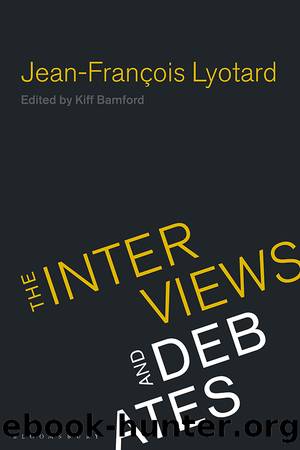Jean-Francois Lyotard by Jean-Francois Lyotard;Kiff Bamford;

Author:Jean-Francois Lyotard;Kiff Bamford;
Language: eng
Format: epub
Publisher: Bloomsbury UK
(Coup didactique, I)
V. R. & V. – In your 1985 interview with Bernard Blistène, you accept the qualification that he makes of you as a philosopher who shows something.3 Since Discourse, Figure and the essays which surround that intricate book, you seem to appear as an aesthetician rather than a philosopher; you present something to the senses instead of trying to recover and articulate that which isn’t said in what you say. Three years ago, you yourself remarked on the continuity which exists from your first to your most recent writing,4 notably between the figural of Discourse, Figure and the ‘Arrive-t-il?’ (Is it happening?) which is introduced in The Differend. Your writings could be summed up by saying that they all bear witness to the monster of truth and of good which exists outside of discourse and its oppositional values, outside of our languages, whether denotative or axiological, and the criteria which define them, but that a refusal of articulation is achieved by a discursive skewing. This monstrosity – which is nothing other than being – has access to the discourse at the critical moment, which is to say at the moment that the discourse cannot manage to sustain and continue itself out of its own resources. Thus we have the ‘line’, the figure of Discourse, Figure: is it a place of intensity (a notion fundamental to Libidinal Economy) or a place within the discourse of ontico-ontological being (completely destroying it, which is to say crushing it under its enormous weight); thus we have the ‘Arrive-t-il?’ (Is it happening?): isn’t this the uncertain but inescapable moment which precedes the linking (up) of one phrase to another, and which is characterized by the anguishing embarrassment of choice with regard to the kind of discourse which will fix the regime of the phrase with which I am now confronted, and to which I must fasten myself?
It is here that the possibility of articulating being is arrested, at the point which precedes its articulation and which is never itself articulated. And it is here that we discover that, at the most, we can bear witness for being, and for the revolution that it implies; to articulate it is to have lost it. Now, with his notion of the sublime, Kant tried to think within the world, as it were, what could not be presented there, in other words, what could not be recovered and therefore articulated and demonstrated. Kant’s mode of thought here is symbolic; it is a question of alluding to something unpresentable. In the text which clearly parodies the title of Kant’s piece on the Enlightenment – ‘Answer to the Question: What Is the Postmodern?’5 – you indicate that from the time of the Enlightenment two paths are open. The symbolic stress may be placed on the powerlessness of the faculty or presentation, and therefore on nostalgia for what is absent. It may, on the other hand, be placed on the power of the faculty of imaginative understanding, which results in
Download
This site does not store any files on its server. We only index and link to content provided by other sites. Please contact the content providers to delete copyright contents if any and email us, we'll remove relevant links or contents immediately.
Hit Refresh by Satya Nadella(8338)
When Breath Becomes Air by Paul Kalanithi(7264)
The Girl Without a Voice by Casey Watson(7263)
Do No Harm Stories of Life, Death and Brain Surgery by Henry Marsh(6336)
A Court of Wings and Ruin by Sarah J. Maas(6076)
Hunger by Roxane Gay(4218)
Shoe Dog by Phil Knight(4167)
Everything Happens for a Reason by Kate Bowler(4067)
A Higher Loyalty: Truth, Lies, and Leadership by James Comey(4033)
The Rules Do Not Apply by Ariel Levy(3906)
Tuesdays with Morrie by Mitch Albom(3832)
The Immortal Life of Henrietta Lacks by Rebecca Skloot(3826)
How to Change Your Mind by Michael Pollan(3679)
Millionaire: The Philanderer, Gambler, and Duelist Who Invented Modern Finance by Janet Gleeson(3569)
All Creatures Great and Small by James Herriot(3516)
Elon Musk by Ashlee Vance(3455)
Tokyo Vice: An American Reporter on the Police Beat in Japan by Jake Adelstein(3440)
Man and His Symbols by Carl Gustav Jung(3315)
The Money Culture by Michael Lewis(3284)
